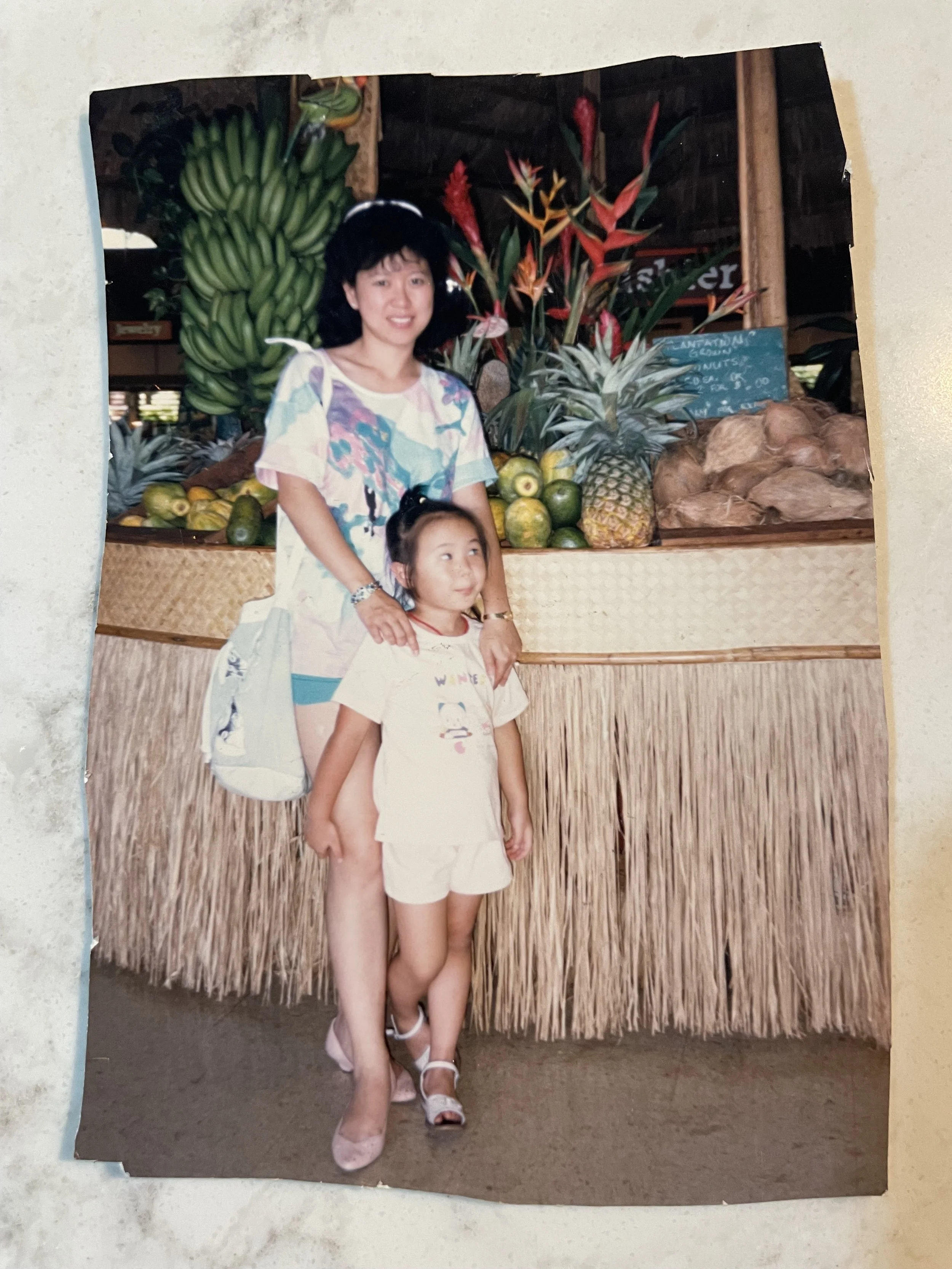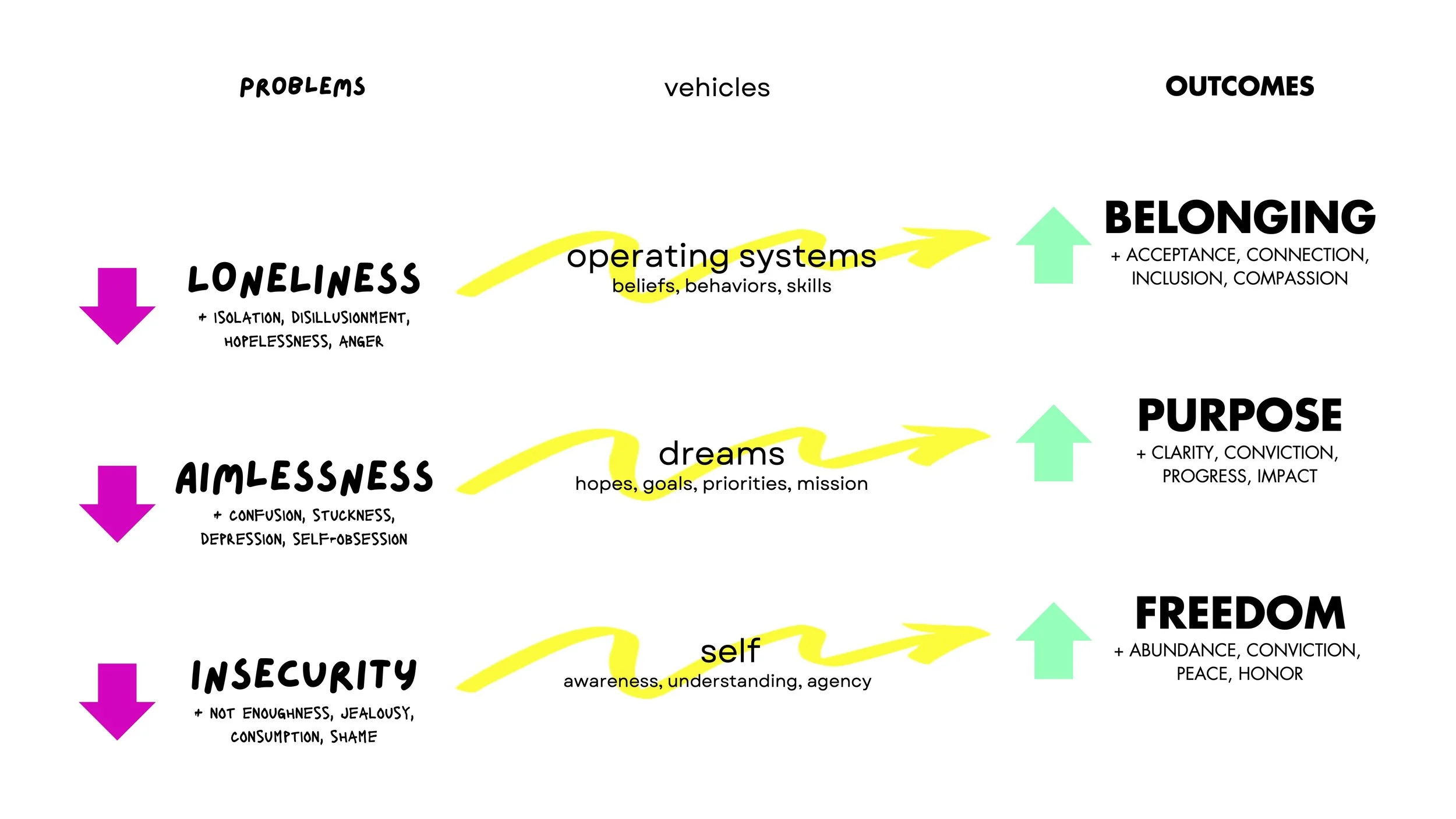It always comes back to the beginning…
By age 10 I understood how significantly we impact the people around us.
My brave, single, immigrant mom often came home from work stressed, anxious, exhausted, and scared and that deeply affected her joy and our relationship.
I wanted her to be calm and happy, but I also wanted ME to be calm and happy.
My child brain thought… I can’t live that life ➡️ I want to be happy so I’m not an asshole to other people ➡️ I have to love my job to be happy ➡️ I love basketball ➡️ I have to be Commissioner of the NBA. 🙃 🏀
My adult brain now understands there’s a bit more nuance, but 10yo me wasn’t far off.
And I’m grateful I haven’t lost sight of what that little kid already knew…
We live in a WE world. Not an I world.
And it’s all of our jobs to make it better.
Pillars of The Work
Love.
Care and compassion for truth, wholeness, and healing for humanity.
Collective Care.
Because we exist in and directly impact The Collective.
Self-Trust.
Clarity and belief in the truth of who you are and what matters to you.
Courage.
Openness to explore the uncomfortable within ourselves and others.
Purpose.
Understand what you are on the planet for and shaping your life to it.
Critical Thinking.
Evaluate our self and the world with discernment and rigor.
Magnanimity.
Belief in our enoughness so we can live generously and with honor.
Agency.
Lead your self and life with courage, commitment, and conviction.
Mental Freedom.
Deprogram our OS from the beliefs that aren’t our own and fortifying what is.
OBJECTIVES
BELONGING
Collective Care.
Because we exist in and directly impact The Collective
PURPOSE
Clarity & Conviction.
In who you are, why you are here, and what matters to you
FREEDOM
Mental Freedom.
Deprogram our OS from the beliefs that aren’t our own and fortifying what is
The Work / Skills
Love.
Care and compassion for truth, wholeness, and healing for humanity
Agency.
Lead your life with discernment, rigor, and conviction
Self-trust.
Creation.
Imagine new futures and own
NORTH STARS / BEING
Reciprocity.
Mutual exchange of support, cooperation, and
Magnanimity.
Trust and belief in the truth of who you are and live generously and with honor
Fortitude.
Fearlessness with discomfort in navigating challenges and uncertainty.
Vehicles
xxx.
Care and compassion for truth, wholeness, and healing for humanity
xxx.
Trust and belief in the truth of who you are live generously and with honor
Curiosity > Openness
Creativity > Imagination
Play > Joy
Experimentation > Bravery
Service > Generosity
Critical Thinking >
Being with uncertainty
Face the unknown
Finding our play
Lean into adventure
self-reliance and learning
Being with ourselves
xxx.
Comfort with discomfort in the face of ourselves and others
my theory of change
for a kinder & more loving world
from the bottom up
i’m still strategizing my top down contribution 🙃
LONELINESS
1 in 5 in the US experience daily loneliness (2024, Gallup)
1 out of 4.3 (23%) adults worldwide experience daily loneliness
DIVISION
bipartisan votes in Congress has decreased from 55% in the late 1980s to around 24% in recent years (2020, Brookings)
20% of votes were bipartisan, indicating a continued decline in cross-party collaboration (2024, US Congress)
ISOLATION & ECHO CHAMBERS
68% of U.S. adults believe social media algorithms primarily show them content that aligns with their existing beliefs, reinforcing polarization (2023, Pew)
Harvard Study of Adult Development, Vaillant
Build Strong Relationships:
"Social connections are the most powerful predictors of happiness." (Source: Harvard Study of Adult Development, Vaillant, G. E. (2012). Triumphs of Experience)
Practice Gratitude:
"Participants who kept a gratitude journal reported greater life satisfaction and a reduction in depressive symptoms." (Source: Emmons, R. A., & McCullough, M. E. (2003). "Counting blessings versus burdens.")
Engage in Meaningful Activities:
"Having a sense of purpose in life significantly predicts greater well-being and life satisfaction." (Source: Ryff, C. D., & Singer, B. (1998). "The Contours of Positive Human Health.")
Embrace Resilience:
"Resilience is associated with better mental health outcomes in the face of stress." (Source: Masten, A. S. (2001). "Ordinary Magic.")
Limit Social Comparison:
"Social comparison processes can negatively impact self-esteem and life satisfaction." (Source: Wood, J. V. (1989). "Theory and Research Concerning Social Comparison.")
Spend Time in Nature:
"Exposure to natural environments is associated with reduced stress and improved mood." (Source: Kaplan, S. (1995). "The restorative benefits of nature.")
Harvard’s Study of Adult Development, one of the longest-running studies of human health and happiness (since 1938), shows these key insights into living long, happy lives:
Quality of Relationships:
Maintaining a sense of community and social engagement is vital. The study consistently highlights that strong, supportive relationships (family, friends, community) is the strongest predictor of happiness and health in later life. It's not the number of friends, but the depth and quality of relationships that matter most.
Loneliness is Harmful
Loneliness has a profound impact on physical and mental health, leading to earlier decline in brain function and a shorter lifespan.
Emotional Intelligence & Regulation:
People who can manage stress and maintain emotional balance tend to fare better in life both mentally and physically. Managing our emotions and communicating effectively contributes to better relationships and overall well-being.
Coping Mechanisms:
Developing healthy coping strategies for stress and adversity is essential for resilience and long-term satisfaction.
Physical Health:
Regular physical activity and maintaining a healthy lifestyle correlate strongly with happiness and longevity. Those who remained physically active, even in small ways, tend to live longer and report higher satisfaction.
Purpose and Meaning:
Finding meaning and purpose in life, whether through work, hobbies, or community involvement, contributes significantly to happiness. People who find meaning in their work and maintain a sense of purpose, even after retirement, generally report higher levels of happiness.
Adaptability:
The ability to adapt to life’s challenges and changes is crucial for maintaining happiness and well-being over time.

